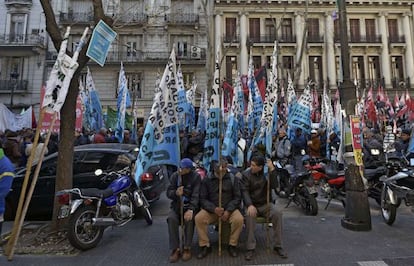Unions go on general strike in Argentina
Protesters want to renegotiate wages and income tax in view of rampant inflation


Three out of Argentina’s five unions — those that oppose the policies of President Cristina Fernández de Kirchner — began a general strike on Thursday to protest the country’s economic crisis.
One of these, a branch of the left-wing Central de Trabajadores de Argentina (CTA), began the stoppage earlier, at noon on Wednesday. Demonstrators marched to Congress and set up pickets on seven access roads to the capital, Buenos Aires.
But the strike really gained traction on Thursday, when the powerful Confederación General del Trabajo (CGT) joined in. Their action managed to bring to a halt the circulation of trucks, trains, a subway line, intercity buses and airplanes, and they also shut down numerous banks, restaurants, courthouses, gas stations, ports, garbage-collection services and soccer stadium box offices. City buses were still running, but access to the city was blocked.
Protesters want a one-year ban on company layoffs and payment suspensions
The national police managed to clear some roads, while the state secretary for security, Sergio Berni, said more police action was likely to end the more than 1,000 roadblocks that protesters have promised to set up across the country.
Hugo Moyano, a union leader who used to be a follower of Kirchnerism until 2011, said on Wednesday that the responsibility for any incident as a result of police action will lay at the government’s door.
Protesters are asking the government to introduce a one-year ban on company layoffs and payment suspensions. Unemployment rose to 7.5 percent in the second quarter of the year, up from 7.2 percent a year earlier. Economic output is stagnating, while annual inflation has passed the 31-percent mark, according to official figures.
The executive has admitted that unions negotiated an average pay raise of 29.7 percent. But protesters feel that wages need to be renegotiated in the light of current inflation, which has surpassed the forecasts made in early 2014. Opposing unions also want employees to stop paying income tax, a demand the government cannot accept, making inflation adjustment a more realistic topic of negotiation.
Protesters promised more than 1,000 roadblocks across the country on Thursday
Meanwhile, the strong rise of the dollar in the small but influential illegal exchange market (where on Wednesday the US currency reached 14.38 pesos, 71-percent higher than the official exchange rate) also fueled speculation about a devaluation, a move that would increase inflation even more. The peso was devalued in January in the wake of the debt crisis that began last summer.
Meanwhile, the unions that remain faithful to the government admitted that inflation is a problem and that income tax needs to be updated, but added that this is no time to put pressure on authorities, given their ongoing battle with the US justice system over debt repayment.
On Wednesday, a congressional committee approved a bill offering Argentina’s creditors in the US, Europe and Japan the possibility of getting paid in Argentina, thus bypassing the US legal decision forcing Fernández de Kirchner to first pay the speculative funds that rejected a restructuring of their debt in 2005 and 2010.
Faced with its third general strike since 2012, the government has been trying to keep citizens happy with measures such as rationing beef exports to bring down domestic prices on Argentineans’ favorite dish.
Tu suscripción se está usando en otro dispositivo
¿Quieres añadir otro usuario a tu suscripción?
Si continúas leyendo en este dispositivo, no se podrá leer en el otro.
FlechaTu suscripción se está usando en otro dispositivo y solo puedes acceder a EL PAÍS desde un dispositivo a la vez.
Si quieres compartir tu cuenta, cambia tu suscripción a la modalidad Premium, así podrás añadir otro usuario. Cada uno accederá con su propia cuenta de email, lo que os permitirá personalizar vuestra experiencia en EL PAÍS.
¿Tienes una suscripción de empresa? Accede aquí para contratar más cuentas.
En el caso de no saber quién está usando tu cuenta, te recomendamos cambiar tu contraseña aquí.
Si decides continuar compartiendo tu cuenta, este mensaje se mostrará en tu dispositivo y en el de la otra persona que está usando tu cuenta de forma indefinida, afectando a tu experiencia de lectura. Puedes consultar aquí los términos y condiciones de la suscripción digital.








































